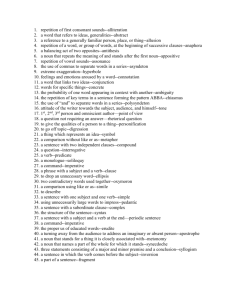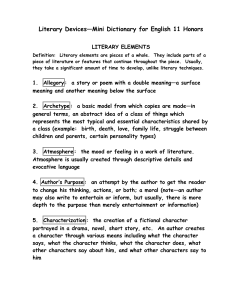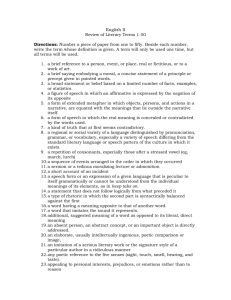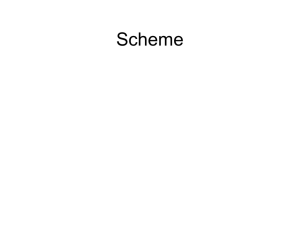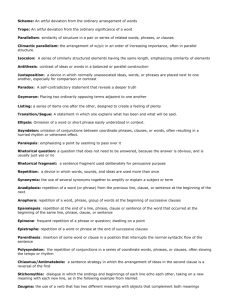Literary and Rhetorical Terms
advertisement
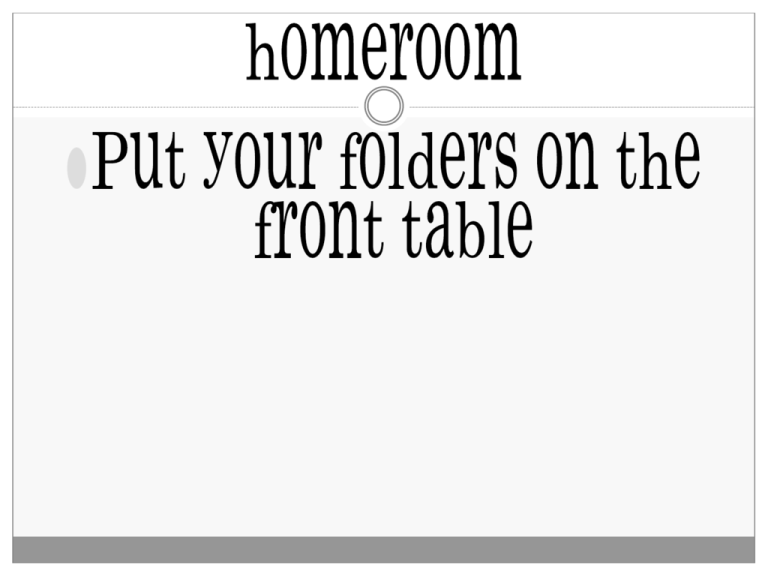
Pick up a “Meet Elie Wiesel” article; you are to read and annotate it for homework tonight. Complete the DGP for today. Seating Chart – 4th Period Name Seat Number Rufus Barron Ashton Barwick Luke Benton Jimmy Cipriani Leighton Collins Pierce Gandy Sydney Garcia Taylor Hester Sarah Kefalas Kayla Moore Carson Odom Cedric Robinson Veronica Robinson Jared Russell Solomon Shaba 1 27 3 4 2 6 7 23 16 10 11 12 8 14 15 Peyton Smith Jay Tillman Micah Carroll Chase Darley Ryan Fitzgerald Matthew Mancil Pace Mercer Logan Prince 9 18 25 5 20 21 19 13 Seating Chart – 5th Period Name Seat Number Will Baillargeon Kenneth Barrentine Zach Beckwith Zena Burgos Kuldip Delada Zach Fletcher Reagan Gurule Nick Herndon Rebeka Ingles Kade Little Isaiah Manning Kasey Melton Ethan Mims Maranda Newsome Lexie Redfearn 1 2 3 6 9 15 7 8 25 10 11 12 13 14 18 Nathan Sherrod Caitlin West Mia Williams Alyssia Godwin Lane Quick Trent Smith 16 17 4 19 23 5 Study for your vocabulary quiz. You have five minutes. After the quiz, write down lesson 1.2 notes in Cornell format. You can work on note cards after you finish the notes. Remember – you have 20 note cards due Monday. Each sentence contains an italicized phrase; tell which type it is: participle, gerund, or infinitive. [1 pt each] 1. President Kennedy’s ability to improvise in the middle of a heated debate made him seem collected and relaxed. 1. 2. It is best to be circumspect when buying a new car so that no one takes advantage of you. 2. 3. Smiling brightly for the camera, President Kennedy became a hit with the television audience. 3. 4. Not being able to walk did not stop Franklin D. Roosevelt from becoming president of the United States. 4. 5. Listening to the teacher is not always easy if he or she is monotone. Pick up a verbal worksheet from the table. Example: talk G: Talking to my friends on the phone is one of my favorite activities. P: Talking loudly, Mrs. Rogers did not hear the bell ring. I: One idea I have is to talk to the principal about our plans. You are to complete this AFTER you finish your reading check over last night’s article. You have two sheets that MUST be brought back signed by you and your parents – 1. Article of the Week sheet (yellow) 2. Plagiarism Pledge sheet (white) If you do not have them turned in by tomorrow, you will be in lunch detention until you bring them. Put your research questions in the basket. Using your DGP sheet from last week, complete today’s assignment. This week’s sentence is: our family had a picnic on labor day On the index card provided, write down three things you learned in this class last week. Put the card in the basket when you are finished. paradox foil story or poem in which characters, settings, and events stand for other people or events or for abstract ideas or qualities. EXAMPLE: Animal Farm; Dante’s Inferno; Lord of the Flies repetition of the same or similar consonant sounds in words that are close together. EXAMPLE: Why not waste a wild weekend at Westmore Water Park? reference to someone or something that is known from history, literature, religion, politics, sports, science, or another branch of culture. An indirect reference to something (usually from literature, etc.). Example: “When she lost her job, she acted like a Scrooge, and refused to buy anything that wasn’t necessary.” Scrooge was an extremely stingy character from Charles Dickens’, A Christmas Carol. Nemesis The Greek goddess of Vengeance Today, a “nemesis” is an avenger. One’s nemesis is that which brings on one’s destruction or downfall Hercules A mythical Greek hero renowned for his great strength and for performing the 12 labors. Hercules performed these labors as retribution or payment for the slaying of his family while under Hera’s spell of madness. Today, any act of extraordinary power, extent, intensity, or difficulty is said to be Herculean. deliberately suggesting two or more different, and sometimes conflicting, meanings in a work. Repetition of a word, phrase, or clause at the beginning of two or more sentences in a row. This is a deliberate form of repetition and helps make the writer’s point more coherent. Ex: Each woman stood on the steps of her house. Each woman clapped. Each one held her breath as the men rode into town. the opposition or contrast of ideas; the direct opposite ex. "Not that I loved Caesar less, but that I loved Rome more." (Julius Caesar, III, ii) brief, cleverly worded statement that makes a wise observation about life, or of a principle or accepted general truth. Also called maxim, epigram. Examples: The simplest questions are the hardest to answer. [Northrop Frye] Actions speak louder than words. If you do what you've always done you'll get what you've always got. calling out to an imaginary, dead, or absent person, or to a place or thing, or a personified abstract idea. If the character is asking a god or goddess for inspiration it is called an invocation "Twinkle, twinkle, little star, How I wonder what you are. Up above the world so high, Like a diamond in the sky." the repetition of similar vowel sounds followed by different consonant sounds especially in words that are together. Example: “Men sell the wedding bells.” think: action Commas used without conjunction to separate a series of words, thus emphasizing the parts equally: “I came, I saw, I conquered.” [Julius Caesar] is a word or phrase, often a figure of speech, that has become lifeless because of overuse word or phrase in everyday use in conversation and informal writing but is inappropriate for formal situations. Example: “He’s out of his head if he thinks I’m gonna go for such a stupid idea. the associations and emotional overtones that have become attached to a word or phrase, in addition to its strict dictionary definition speaker or writer’s choice of words the deliberate omission of a word or words that are implied by the context Examples: "The average person thinks he isn't." –Father Larry Lorenzoni The term "average" is omitted but understood after "isn't." John forgives Mary and Mary, John. Note that the comma signals what has been elided, "forgives" Device of repetition in which the same expression (single word or phrase) is repeated at the end of two or more lines, clauses, or sentences (it is the opposite of anaphora) Example: What lies behind us and what lies before us are tiny compared to what lies within us." — Emerson an adjective or adjective phrase applied to a person or thing that is frequently used to emphasize a characteristic quality. “Father of our country” and “the great Emancipator” are examples. A Homeric epithet is a compound adjective used with a person or thing: “swift-footed Achilles”; “rosy-fingered dawn.” a substitution of a more pleasant expression for one whose meaning may come across as rude or offensive act of interpreting or discovering the meaning of a text, usually involves close reading and special attention to figurative language Words which are inaccurate if interpreted literally, but are used to describe. Similes and metaphors are common forms character who acts as contrast to another character Often a funny side kick to the dashing hero, or a villain contrasting the hero figure of speech that uses an incredible exaggeration or overstatement, for effect “If I told you once, I’ve told you a million times….” the use of language to evoke a picture or a concrete sensation of a person, a thing, a place, or an experience the reversal of the normal word order in a sentence or phrase Example: How wonderful the weather is today! discrepancy between appearances and reality poetic and rhetorical device in which normally unassociated ideas, words, or phrases are placed next to one another, creating an effect of surprise and wit. a figure of speech that makes a comparison between two unlike things without the use of such specific words of comparison as like, as, than, or resembles does not state explicitly the two terms of the comparison “I like to see it lap the miles” is an implied metaphor in which the verb lap implies a comparison between “it” and some animal that “laps” up water. a metaphor that has gotten out of control and mixes its terms so that they are visually or imaginatively incompatible. “The President is a lame duck who is running out of gas.” An atmosphere created by a writer’s diction and the details selected a recurring image, word, phrase, action, idea, object, or situation used throughout a work (or in several works by one author), unifying the work by tying the current situation to previous ones, or new ideas to the theme. Harper Lee uses the mockingbird throughout To Kill a Mockingbird. a figure of speech that combines opposite or contradictory terms in a brief phrase “Jumbo shrimp” “Pretty ugly” “Bitter-sweet” a statement that appears self-contradictory, but that reveals a kind of truth Example: Whosoever loses his life, shall find it. (parallelism) the repetition of words or phrases that have similar grammatical structures. think: pause sentence which uses a conjunction with NO commas to separate the items in a series used to slow down the pace of the writing a “play on words” based on the multiple meanings of a single word or on words that sound alike but mean different things Did you hear about the butcher who backed into his meat grinder & got a little behind in his work? What is the difference between a well dressed man and a dog? The man wears a suit, the dog just pants. Two peanuts walk into a bar. One was a salted. There were two ships. One had red paint, one had blue paint. They collided. At last report, the survivors were marooned. Sir Lancelot once had a very bad dream about his horse. It was a knight mare. Zucchini: a two-piece bathing suit for animals. a type of writing that ridicules the shortcomings of people or institutions in an attempt to bring about a change a fixed idea or conception of a character or an idea which does not allow for any individuality, often based on religious, social, or racial prejudices the distinctive way in which a writer uses language: a writer’s distinctive use of diction, tone, and syntax a person, place, thing, or event stands for something more than itself Examples: a wedding ring represents??? the Statue of Liberty represents?????? The way an author chooses to join words into phrases, clauses, and sentences the insight about human life that is revealed in a literary work Examples: Overcoming challenges/obstacles; perseverance Love/friendship conquers all Be happy with yourself Compassion for others Courage in the face of defeat the attitude a writer takes toward the subject of a work, the characters in it, or the audience, revealed through diction, figurative language, and organization in general, a story in which a heroic character either dies or comes to some other unhappy end a statement that says less than what is meant Example: During the second war with Iraq, American troops complained of a fierce sand storm that made even the night-vision equipment useless. A British commando commented about the storm: “It’s a bit breezy.” the art of persuasion in speaking or writing using language that will increase the persuasiveness of a piece of writing Some common rhetorical devices: Parallel structure Rhetorical questions Sentence variety Logical and emotional appeals : the writer’s character or image; using a person’s credibility to convince audience (think: “ethics”) : playing on the emotions of the audience (think: “sympathy”) : logical arguments; use of logic, claims, and evidence to convince an audience (think: “logic”) : errors in reasoning : attempting to persuade one’s audience by appealing to their emotions a question asked for an effect, and not actually requiring an answer questioning oneself (or rhetorically asking the audience), often pretending to be in doubt On the back of your notes, write a short summary of what we learned in class today. It should be a paragraph of at least seven sentences. Focus on what was new in the lesson for you. “I Have a Dream” 1. Complete the chart, finding examples of figurative language and explaining them. Example: “we’ve come to our nation’s capital to cash a check” figurative language: metaphor explanation: check = justice/freedom/equality 2. Complete the quickwrite on the speech. 3. Find three examples of King using repetition, write them down, and explain each one. (You will do this on your own paper and attach it to the chart).
